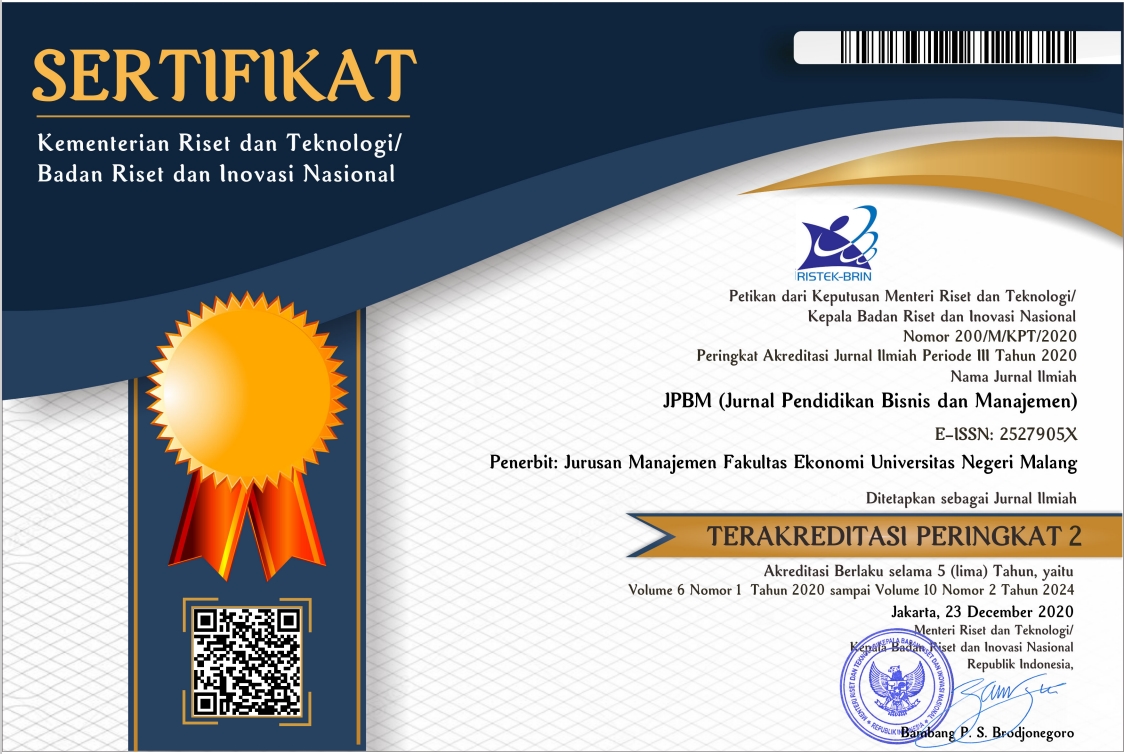Chinese Ethnic Family Entrepreneurship Education Pattern: Study of SMK students in Pasuruan
Abstract
Keywords
Full Text:
PDFReferences
Abdi, F.F., Hafiar, H., dan Novianti,E. (2015). Perilaku Komunikasi Etnis Tionghoa Peranakan dalam Bisnis Keluarga. Jurnal Komunikasi 2 (9), 105-118.
Amin, Z. N., Wibowo, M. E., dan Nusantoro, E. (2014). Perbandingan Orientasi Karir Siswa Keturunan Jawa dengan Siswa Keturunan Tionghoa. Indonesian Journal of Guidance and Counseling Theory and Application 3 (3), 8-16.
Aprilianty, E. (2012). The Effect of Entrepreneur Personality, Entrepreneurship Knowledge, and Environment on Entrepreneurial Interest of Vocational High School Students. Jurnal Pendidikan Vokasi 2 (3), 311-324.
Asyrofi, S. (2012). Beberapa Pemikiran Pendidikan. Malang: Aditya Media Publishing.
Chand, M., Ghorbani, M., 2011. National culture, networks and ethnic entrepreneurship:
A comparison of the Indian and Chinese immigrants in the US. Int. Bus. Rev. 20,
–606. https://doi.org/10.1016/j.ibusrev.2011.02.009
Dimitratos, P., Buck, T., Fletcher, M., Li, N., 2016. The motivation of international entrepreneurship: The case of Chinese transnational entrepreneurs. Int. Bus.
Rev. 25, 1103–1113. https://doi.org/10.1016/j.ibusrev.2016.01.012
Dou, X., Zhu, X., Zhang, J.Q., Wang, J., 2019. Outcomes of entrepreneurship education in
China: A customer experience management perspective. J. Bus. Res. 103, 338–
https://doi.org/10.1016/j.jbusres.2019.01.058
Maresch, D., Harms, R., Kailer, N., Wimmer-Wurm, B., 2016. The impact of entrepreneurship education on the entrepreneurial intention of students in science and engineering versus business studies university programs. Technol.
Forecast. Soc. Change 104, 172–179.
https://doi.org/10.1016/j.techfore.2015.11.006
Olokundun, M., Moses, C.L., Iyiola, O., Ibidunni, S., Ogbari, M., Peter, F., Borishade, T.,
The effect of non traditional teaching methods in entrepreneurship
education on students entrepreneurial interest and business startups: A data article. Data Brief 19, 16–20. https://doi.org/10.1016/j.dib.2018.04.142
Lestari R.A.W.D. (2018). Studi Fenomenologi: Memaknai Tata Kelola Perusahaan Pada Bisnis Keluarga Beretnis Tionghoa Di Indonesia. Jurnal Akuntansi, Prodi. Akuntansi – FEB, UNIPMA 2 (2), 307-335.
Mansor, M. dan Othman, N. (2011). CoBLAS:Incculcating Entrepreneurial Culture among Higher Education Institution’s Students. International Journal of Sosial Science and Humanity 1 (1), 86-91.
Nugraha, A.E.P., Soesilowati, E., dan Prasetyo, E. (2015). Analisis Bisnis Model Pendidikan Kewirausahaan Keluarga Etnis Tionghoa di Kota Semarang. Journal of Economic Education 4 (2), 43-51.
Poutziouris, P., Wang, Y., dan Chan, S. (2002). Chinese Entrepreneurship: The Development of Small Family Firms in China. Journal of Small Business and Enterprise Development 9 (4), 1-21.
Rahayu, W.P. (2012). Sikap Kewirausahaan Siswa Sekolah Menengah Kejuruan. Ilmu pendidikan 1 (18), 98-104.
Seran, E.Y. (2015). Gaya Belajar Siswa Sekolah Dasar Berdasarkan Latar Belakang Etnis (Tionghoa-Dayak) di Kabupaten Sintang Kalimantan Barat. Educhild: Jurnal Pendidikan Sosial dan Budaya 4 (1), 1-7.
Soenjoto, W. P. P. (2015). Analisis Bisnis Etnis Cina Berbasis Syariah. Economic: Jurnal Ekonomi dan Hukum Islam 5 (2), 22-48.
Suharyadi, Arissetyanto, N., Purwanto, S.K., dan Maman, F. (2007). Kewirausahaan (Membangun Usaha Sukses Sejak Usia Muda). Jakarta: Salemba Empat.
Suryana. (2006). Kewirausahaan (Pedoman Praktis: Kiat dan Proses Menuju Sukses). Bandung: Salemba Empat.
Suryana. (2013). Kewirausahaan (Kiat dan Proses Menuju Sukses). Bandung: Salemba Empat.
Tim Pengembang Ilmu Pendidikan FIP-UPI. (2007). Ilmu dan Aplikasi Pendidikan Bagian 4 Pendidikan Lintas Bidang. Bandung: PT. Imperial Bhakti Utama.
Wijayaputra, N.W., dan Wibisono, C.H. (2013). Perbandingan Gaya Hidup Etnis Cina dan Etnis Bali di Yogyakarta. Jurnal Ekonomi dan Bisnis 25 (1), 107-124.
Winarno, A. (2010). Pendidikan Kewirausahaan Berbasis Nilai (dilengkapi Pedoman Pembelajaran Model Internalisasi). Malang: Penerbit Putra Media Nusantara.
Zein, A.B. (2000). Etnis Cina (dalam Potret Pembauran di Indonesia). Jakarta: PT. Prestasi Insan Indonesia.
DOI: http://dx.doi.org/10.17977/um003v5i22019p085
Refbacks
- There are currently no refbacks.
JPBM (Jurnal Pendidikan dan Bisnis Manajemen) is licensed under a Creative Commons Attribution-NonCommercial-ShareAlike 4.0 International License.
JPBM (Jurnal Pendidikan dan Bisnis Manajemen) is abstracted and indexed in :
















